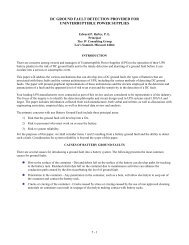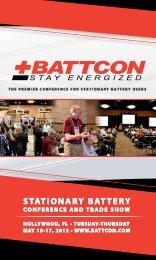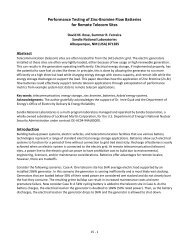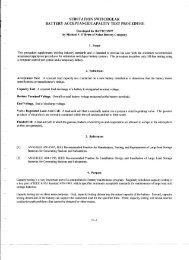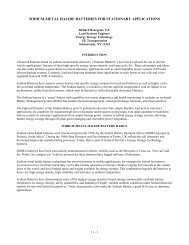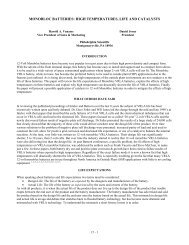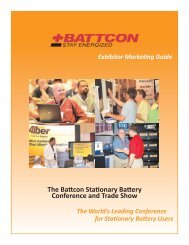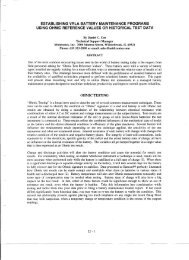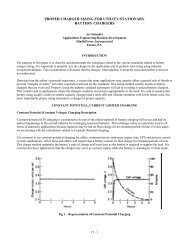HEAT TOLERANT NiMH BATTERIES FOR STATIONARY POWER
HEAT TOLERANT NiMH BATTERIES FOR STATIONARY POWER
HEAT TOLERANT NiMH BATTERIES FOR STATIONARY POWER
Create successful ePaper yourself
Turn your PDF publications into a flip-book with our unique Google optimized e-Paper software.
300<br />
250<br />
Power (W/kg)<br />
200<br />
150<br />
100<br />
50<br />
Standard<br />
Ni(OH) 2<br />
Ovonic GreenLife<br />
Ni(OH) 2<br />
0<br />
0 200 400 600 800 1000<br />
Cycles<br />
Figure 5: 70⁰C EV battery improvement<br />
If all of these improvements (energy, power, charge retention, cycle life, and high temperature resistance) could be taken<br />
collectively into a single design, the resulting battery would represent an extremely attractive solution for current and<br />
emerging stationary power applications.<br />
<strong>STATIONARY</strong> APPLICATIONS<br />
The concept of utilizing <strong>NiMH</strong> batteries for stationary applications was introduced at Battcon 2005. At that time, a value<br />
proposition of reduced weight and size compared to lead acid was proposed. A case study of a 560kW UPS battery<br />
replacement showed an incredible 68% floor space reduction achieved by replacing a room full of flooded lead acid batteries<br />
with stacks of <strong>NiMH</strong> modules. 1 While this is one important benefit of <strong>NiMH</strong>, the technology brings a host of persuasively<br />
beneficial attributes for stationary customers.<br />
Consider the telecommunications market. As power systems have become further distributed, more and more equipment is<br />
installed in outdoor enclosures. These enclosures are typically exposed to wide temperature fluctuations where prolonged<br />
exposure to elevated temperature which can severely shorten the life of VRLA batteries. Some users have installed air<br />
conditioning systems to maintain appropriate temperatures to extend battery life, but this practice can subject the customer to<br />
substantial operating and maintenance expenses. Some battery manufacturers have begun marketing advanced NiCd and Liion<br />
batteries as higher temperature solutions allowing for warmer operating conditions while preserving battery life. 2<br />
However, as shown in the graph in Figure 6, these “advanced solutions” pale in comparison to the inherent temperature<br />
capability of <strong>NiMH</strong> technology. With the ability to operate at temperatures as high as 70⁰C (158⁰F), <strong>NiMH</strong> batteries can<br />
eliminate the need for expensive temperature controlling systems. We see the existing telecom outside plant application as an<br />
immediate, ideal fit for <strong>NiMH</strong> technology. Similarly, the high temperature capability of <strong>NiMH</strong> batteries could allow central<br />
office, data center, and server room operators to reduce their operating costs by<br />
slashing climate control expenses.<br />
Looking forward, significant attention is being focused on the emerging “smart grid”<br />
where utility-scale storage will be required to balance supply of power generated<br />
from intermittent renewable sources along with fluctuating demand created by large<br />
numbers of customers potentially charging plug-in hybrid vehicles. According to<br />
GTM Research, storing electricity on the grid could become a $2.5B market by 2015.<br />
Utilities see energy storage as a means to utilize the existing infrastructure more<br />
efficiently through balancing supply and demand peaks. In order to operate in a cost<br />
effective manner, such grid storage systems will require extensive cycle life with<br />
very high round-trip efficiency. <strong>NiMH</strong> battery solutions have demonstrated<br />
efficiencies greater than 95% with exceptional cycle life as illustrated previously in<br />
Figure 4.<br />
Figure 6: Maximum temperature<br />
by battery chemistry<br />
12 - 4



